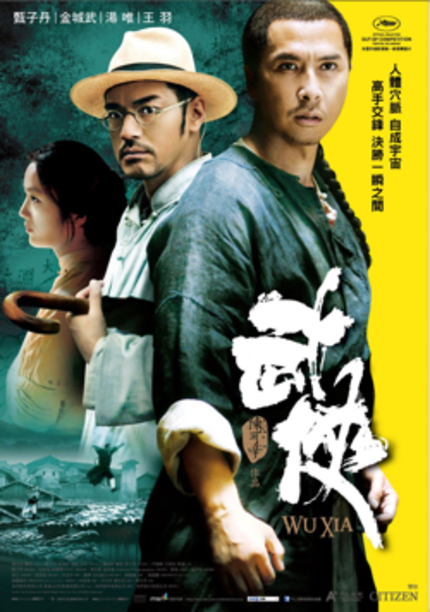WU XIA Review

The year is 1917 and in the small village of Liu, on the Yunnan/Sichuan border in South West China, the peaceful harmony of Liu Jinxi's family life is about to be shattered. A couple of traveling crooks attempt to stick up the village store, only for Liu (Donnie Yen) to reluctantly intervene and try and stop them. A few moments later both bandits are dead and Liu has been proclaimed a local hero. However, when Constable Xu Baijiu (Takeshi Kaneshiro) arrives to investigate, he discovers one of the dead to be a notorious bandit on the Ten Most Wanted List. The local magistrate is thrilled that such a danger to society was apprehended, albeit posthumously, in his district, but Xu is suspicious of how Liu the lowly paper maker was able to best two such accomplished warriors. Sure enough, evidence is soon unearthed suggesting that Liu's past may hold some very dark secrets indeed.
While the comparison is an obvious one, Peter Chan's WU XIA is at its heart a Chinese remake of David Cronenberg's A HISTORY OF VIOLENCE. While that film approaches its big reveal with caution, the notion that Donnie Yen's Liu Jinxi was not always a mild-mannered family man is introduced very early on and so the comparison isn't much of a spoiler. The very casting of Yen should be proof enough that his character will show at least modest proficiency in a scuffle and when the opening skirmish appears to show Liu reluctant to do anything but defend himself, we realize almost immediately that this man has something to hide. Liu has a wife (Tang Wei) and two sons, but as Xu's snooping quickly reveals, he has only been in the village for a few years, before which he had a different name and an entirely different role in society.
Kaneshiro's constable is a wounded, lonely soul, scarred by a previous lapse in judgment that left two innocent people dead and himself seriously ill. Xu is reluctant to believe that people can change their ways or that a violent or psychopathic personality can be cured, by penance or punishment. Therefore, once the evidence begins to stack up against Liu and his closely guarded past it only serves to drive the man onwards, truly believing that this quiet, humble villager poses a significant threat to society at large. Xu finds little support, however, from his superiors, who want only to praise Liu for his citizen's arrest and even when Xu believes he has accumulated enough evidence for an arrest warrant, the magistrate still looks for a bribe before he will produce any paperwork.
Director Peter Chan has long been praised as a cinematic stylist and WU XIA does nothing to alter that opinion. While the film is always entertaining and carries its drama at a brisk pace, it is light on plot and shallow on characterization, though never anything less than sumptuous to look at. Chan may have made a Warlord era period piece, but WU XIA is infused with fast cutting, speed ramping, numerous light filters and a thumping rock soundtrack, as he attempts to invigorate his film's historical setting for a young, cine-literate international audience, and certainly fares better than Wuershan did with his migraine-inducing THE BUTCHER, THE CHEF AND THE SWORDSMAN. For the most part, after all, WU XIA is not an action film, but rather a murder investigation by the debilitated and overly meditative Constable Xu. There is a wonderful sequence in which Xu re-imagines the scuffle between Liu and the bandits to determine just how competent a fighter Liu really is. Xu inserts himself into the moment, repeatedly playing the action backwards and forwards until his suspicions are rewarded. Such a surreal moment both of technical wizardry and stylistic anachronism could only be pulled off by a director with Chan's visual dexterity, and he does so beautifully.
There can be no argument that Chan has delivered a beautiful-looking film that caters perfectly to the recognized onscreen personas of his two lead actors. Donnie Yen smiles and scowls his way through the family drama and then fights a bunch of people, as we have come to expect from him. Takeshi Kaneshiro, meanwhile, looks frail yet immaculate from underneath his umbrella, as he philosophizes through voiceover about the human condition. Tang Wei gets little opportunity to be more than the doting and occasionally disappointed wife, who stands idly by as her husband's reputation is dragged through the gutter.
It was widely documented that the project began life as a proposed remake of Chang Cheh's ONE-ARMED SWORDSMAN and although the story eventually took a significantly different path there are still a number of lingering nods for fans of that film. Not least of these is the casting of Jimmy Wang Yu - the original one-armed swordsman himself - as WU XIA's primary villain. Wang only appears in a couple of scenes but is delightfully dastardly and enjoys a fantastic climactic battle with Donnie Yen at the film's finale - even if it does culminate in one of the most staggeringly unnecessary examples of deus ex machina in recent memory. The film's other major fight is a prolonged scuffle with Kara Hui's knife-wielding villainess that begins in the town square before scuttling across the rooftops to crescendo in a stable full of rowdy bulls.
While some viewers may bemoan
the lack of more action, Chan never gives his audience much pause for breath,
infusing numerous otherwise sedentary sequences with a barrage of visual
flourishes to feed our fragile attention spans. Taking all this into account,
WU XIA manages to entertain as both a martial arts film, a crime scene
investigation and a dual character study, but in the end doesn't have a great
deal to actually say on the matter. It's a good-looking and enjoyable
experience, but one suspects it won't be revered in years to come as any kind
of classic of the genre from which it takes its name.







